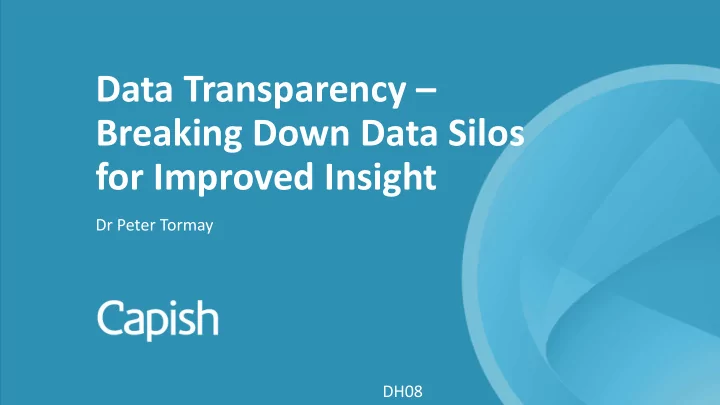

Data Transparency – Breaking Down Data Silos for Improved Insight Dr Peter Tormay DH08
Transparency – An Organisational View Transparency is all about the release of information by institutions or companies that is relevant for the evaluation of these institutions/companies openness communication accountability Trust & Reputation
Transparency Granularity Policy why meaningfulness usefulness constraints Process how Data what privacy context quality secrecy Hosseini et al, Requirements Eng (2018) 23: 251-275
Transparency – a Data View Transparency is all about the free flow of information between stakeholders for the purpose of informed decision making Candidate Preclinical Marketing Discovery Phase I Phase II Phase III selection testing /Sales
Transparency – a Data View Candidate Preclinical Marketing Discovery Phase I Phase II Phase III selection testing /Sales Tacit knowledge Explicit knowledge
Data Quality as a Key Driver in Data Transparency Data Quality Representational Intrinsic Contextual Accessible Accuracy Value –added Interpretability Accessibility Believability Relevance Ease of understanding Access security Objectivity Timeliness Representational consistency Reputation Completeness Concise representation Appropriate amount Data Model Wang et al, J. Manage. Inf. Syst. 12, no. 4
Transparency – Benefits and Challenges Benefits Challenges • Autonomy • Context • Self Control and Motivation • Privacy • Accountability • Security • Feedback • Blame culture • Not a guarantee the right decisions will be made
IT Systems as Real World Representation Transparency challenges Real World Real World inferred from the IS Representation Interpretation Information System
Ontological Data Model Formal representation of a knowledge domain, describing its entities, events and processes and the relationships connecting these entities, events and processes Benefits • To share common understanding of the structure of information among people or software agents • To enable reuse of domain knowledge • To make domain assumptions explicit • To analyse domain knowledge
Ontologies in Life Sciences • Snomed CT • ICD-09/10 Terminologies – Code lists • MedDRA Concerned with the meaning of labels rather than the entity the labels are describing
Holons has Patient Study is part Id: Id: Age: Design: AgeU: Blinding: Sex: Control: • A concept that can be interpreted by itself • Classified according to content • Contains information • Fields, groups and attributes • Contains relations to other Holons • Each relation has a specific meaning
Real World Information Modelling Holons in Action Patient Results Sampling Measurement
Real World Information Modelling Holons in Action Patient Notification Sampling Results Measurement Physician
Real World Information Modelling Holons in Action Batch Patient Notification Results Sampling Indication Actual Product Measurement Physician Treatment Medicine Intake
Real World Information Modelling Holons in Action Building a Conceptual “Mind Map” of Related Holons Batch Person Patient Notification Results Sampling Indication Actual Product Measurement Physician Treatment Medicine Intake Person CV
Real World Information Modelling Holons in Action Building a Conceptual “Mind Map” of Related Holons Batch Person Patient Notification Results Sampling Indication Actual Product Measurement Physician Treatment Medicine Intake Person CV
Ontology vs Instances Patient 1 Patient 2 Patient 3
Graph Database Implementation S 1 P P P 2 1 3 • individual nodes (identity index) • node types (node type identity index) T T T V V V V • property values (property index) A B A 1 1 1 2 • existence of indirect relationships (relation index) BP BP BP BP BP n h n h h
Graph Database Query What adverse events have been reported for patients with elevated liver values S 1 P P 1 2 V V V V 1 2 1 2 AE AE LV LV AE LV LV AE Headache Nausea 1 10 Insomnia 2 1 Depression
Graph database query What adverse events have been reported for patients with elevated liver values S 1 P Select data : 1 Type of Node: “Patient” With (Type of Node: ”Liver Value”, Property: ”Value > 5”) V V 1 2 Fetch : Type of Node:”Adverse Event”, property:”Name” AE AE LV Headache Nausea 10
Conclusions • Data transparency is not just externally but also internally focused • It enables autonomy, self motivation as well as accountability • It makes domain knowledge explicitly available across the company • New technology such as graph databases are data transparency enablers • Ontology based information models with focus on nodes enable better data structures and search capabilities
? Thank you Peter Tormay peter.tormay@capish.com Anna Berg anna.berg@capish.com
Recommend
More recommend